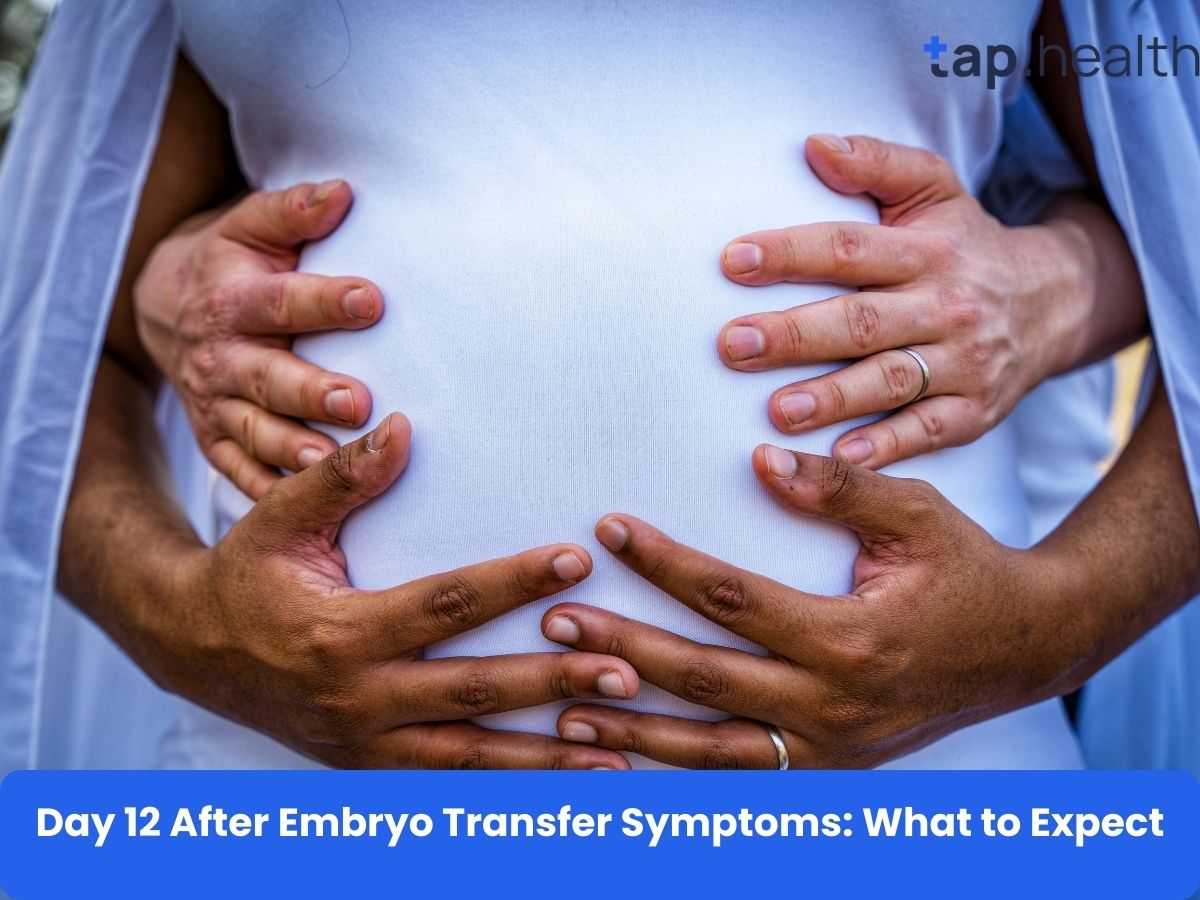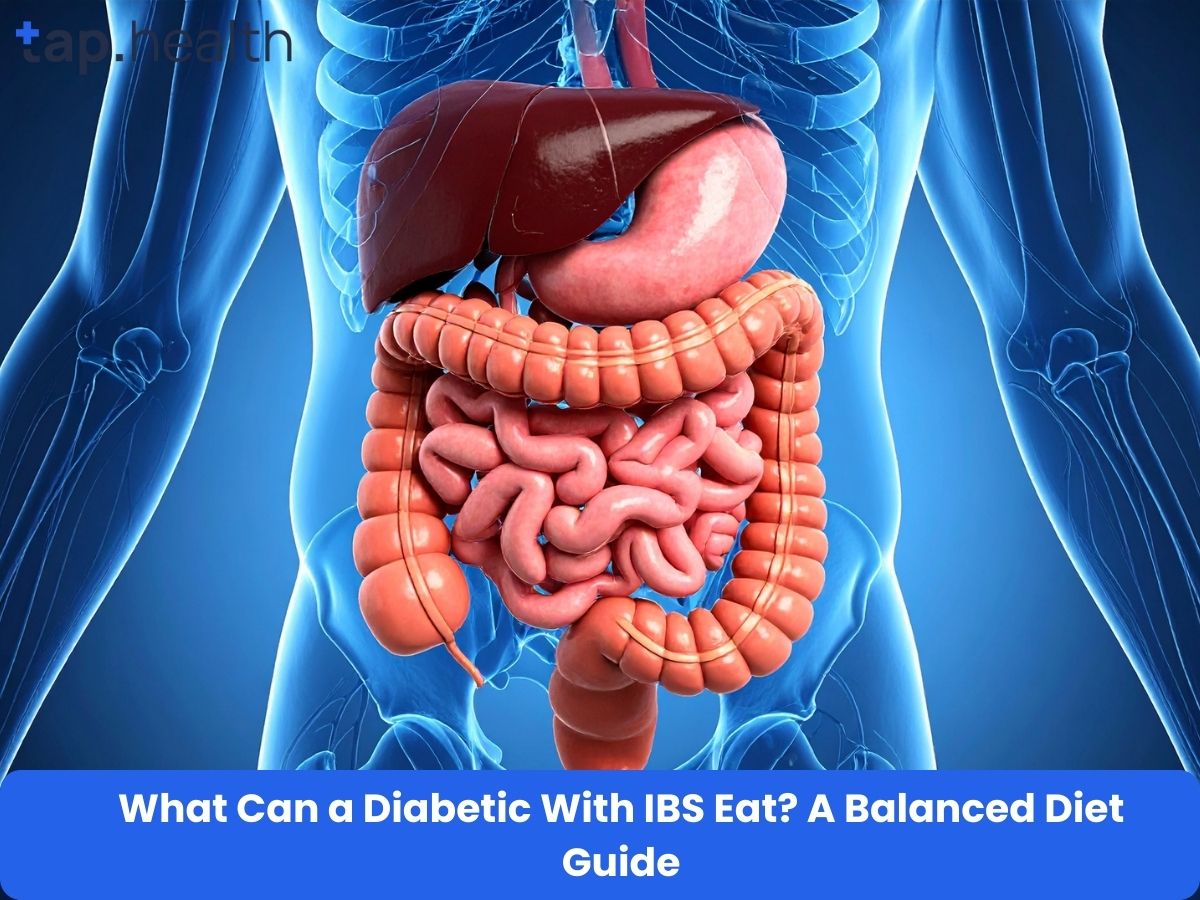The “Two-Week Wait” (2WW) is one of the hardest parts of any IVF journey. You have done the injections, the scans, and the transfer. Now, you are just waiting.
Reaching Day 12 after embryo transfer is a huge milestone. By now, the embryo has likely implanted, and your body is producing the pregnancy hormone called hCG (Human Chorionic Gonadotropin). But this is also a time of high anxiety. You might be feeling everything, or you might be feeling nothing at all.
This guide acts like a friendly hand on your shoulder. We will walk you through exactly what to expect 12 days after embryo transfer, decipher every ache and pain, and explain what is happening inside your womb.
What Happens on Day 12 After Embryo Transfer?
By Day 12, a lot has happened on a microscopic level. If your transfer was successful:
- Implantation is Complete: The embryo has fully burrowed into the lining of your uterus (endometrium).
- Placenta Formation: The cells that will become the placenta are starting to form.
- hCG Production: The placenta cells are pumping out hCG. This is the hormone that turns a pregnancy test positive.
On Day 12, your hCG levels should be high enough to be detected by a blood test (Beta hCG) and usually by a home urine test too.
Common Day 12 After Embryo Transfer Symptoms
Every woman’s body is different. Some women feel like they have the flu, while others feel completely normal. Here is a breakdown of the most common physical signs.
1. Light Spotting or Bleeding
Seeing blood on your underwear can be terrifying. However, light spotting (pink or brown discharge) is often a positive sign after embryo transfer. It can be “implantation bleeding,” which happens when the embryo breaks tiny blood vessels as it attaches to the uterus.
- Note: If the bleeding is heavy red (like a full period) and comes with severe pain, call your doctor.
2. Cramping and “Period Pains”
You might feel mild cramping that feels exactly like your period is coming. This is confusing and scary.
- Why it happens: The uterus is a muscle. It cramps when it is stretching to make room for the baby. Also, the progesterone support (injections or pessaries) can cause cramping.
- Many women search for “11 days after embryo transfer period pains” or “10 days after embryo transfer period pains” because this symptom often starts a few days before the official test date.
3. Sore or Swollen Breasts
Your breasts might feel heavy, tender to the touch, or your nipples might be sensitive. This is a classic early pregnancy sign caused by rising hormone levels.
4. Fatigue (Extreme Tiredness)
If you feel like you could sleep for 12 hours straight, do not worry. Your body is working overtime to grow a new life. Progesterone levels are high, which acts like a natural sedative.
5. Bloating
You might feel like your stomach is swollen or tight. This is very common due to the fertility drugs slowing down your digestion.
6. Back Pain
Day 12 after embryo transfer symptoms back pain is a frequent complaint. As the uterus expands and hormones relax your ligaments, your lower back can ache.
Day 12 After Embryo Transfer No Symptoms: Should I Worry?
This is the number one question patients ask: “I have day 12 after embryo transfer no symptoms. Did it fail?”
The short answer is: No, it does not mean failure.
Many successful pregnancies start with absolute silence.
- The Science: Every body reacts to hormones differently. Some women are very sensitive to hCG; others are not.
- The Medicine: The progesterone supplements you are taking can sometimes mask pregnancy symptoms. Conversely, they can cause fake pregnancy symptoms.
- The Reality: No symptoms 12 days after frozen embryo transfer is just as normal as having many symptoms. Do not lose hope.
Positive Signs vs. Negative Signs
It is hard to tell the difference, but here is a general guide to help you categorize what you are feeling.
Positive Signs After Embryo Transfer
These could indicate pregnancy (but remember, progesterone can mimic these too):
- Missed period (if you are on a natural cycle).
- Nausea or slight dizziness.
- Heightened sense of smell.
- Darkening of the areolas (the skin around nipples).
- Day 12 after embryo transfer positive symptoms often include a feeling of heaviness in the pelvic area.
Negative Signs After Embryo Transfer
These are warning signs that you should report to your clinic immediately:
- Heavy, bright red bleeding that soaks a pad in an hour.
- Severe abdominal pain (could indicate an ectopic pregnancy or ovarian hyperstimulation).
- Fever over 100°F (38°C).
- Foul-smelling discharge.
Timeline: What Happens After Embryo Transfer Day by Day
To understand why you feel this way on Day 12, it helps to look back. Here is a simplified timeline for a Day 5 Blastocyst Transfer:
- Day 1-2: The blastocyst hatches out of its shell.
- Day 3-4: The blastocyst attaches deep into the uterine lining (Implantation).
- Day 5-6: Implantation is complete. Cells begin to differentiate into fetus and placenta.
- Day 7-9: hCG enters the bloodstream. This is when 7 days after embryo transfer symptoms might start appearing faintly.
- Day 10-11: hCG levels are doubling. You might feel what happens on day 11 after embryo transfer—mood swings or nausea.
- Day 12-14: This is usually “Beta Day” (blood test day). Levels are high enough for a definitive result.
If you had a Day 3 Embryo Transfer, everything happens about 2 days later than the timeline above.
Real-Life Scenario
Meet Priya, a 32-year-old software engineer from Bangalore.
The Situation: On Day 12 after her frozen embryo transfer, Priya was in tears. She had zero nausea, her breasts were not sore, and she had mild cramping that felt exactly like her period. She told her husband, “It didn’t work. I can feel my period coming.” She was frantically searching for “12 days after frozen embryo transfer symptoms” and “day 12 after embryo transfer no symptoms” on her phone.
The Outcome: She went for her Beta hCG blood test the next morning. Her result was 180 mIU/mL—a strong positive.
The Lesson: The cramping Priya felt was her uterus stretching, not her period. The lack of nausea was simply her body coping well with the hormones. Symptoms (or lack of them) are not a diagnosis.
Frozen Embryo Transfer (FET) vs. Fresh Transfer: Is Day 12 Different?
You might be searching for “day 12 after frozen embryo transfer symptoms”. Is it different from a fresh cycle?
Yes, slightly.
- Fresh Cycle: Your ovaries are still large and swollen from the egg retrieval surgery. You might feel more bloating and discomfort regardless of pregnancy.
- Frozen Cycle (FET): Your hormone levels are more controlled. The symptoms you feel are purely from the medications (estrogen and progesterone) and the potential pregnancy. Day 12 post embryo transfer symptoms in a frozen cycle are often subtler.
Expert Contribution
Dr. Anjali Rao, Senior Fertility Specialist: “Patients often panic on Day 12. They analyse every twinge. I tell them this: Progesterone is a tricky hormone. It causes bloating, breast tenderness, and mood swings whether you are pregnant or not. The only reliable symptom is a positive Beta hCG blood test. Do not stop your medications because you ‘feel’ not pregnant. I have seen healthy babies born from mothers who had zero symptoms on Day 12.”
Recommendations Grounded in Proven Research and Facts
Based on medical guidelines, here is what you should and should not do on Day 12.
1. Do NOT Stop Medication
Even if you are bleeding or feel no symptoms, continue your progesterone and estrogen support until the doctor tells you to stop. Stopping early can cause a miscarriage if you are pregnant.
2. The Home Pregnancy Test Dilemma
Can you test on Day 12?
- Yes: A sensitive urine test will likely show a positive result by now.
- Caution: If it is negative, it might still be a “false negative” if your urine is dilute. If it is positive, it is likely real (unless you had an HCG trigger shot recently, though by Day 12, the trigger shot is usually out of your system).
- Best Advice: Wait for the blood test. It gives a number, not just a yes/no, which tells doctors how healthy the pregnancy is.
3. Hydration is Key
Drink at least 2-3 litres of water. Dehydration can cause cramping, which will make you panic unnecessarily.
4. Manage Stress
High cortisol (stress hormone) is not good for you. Try deep breathing or gentle walking. Avoid bed rest; research shows strict bed rest does not improve success rates and may actually increase stress.
When to Call the Doctor
While most symptoms are normal, keep an eye out for Ovarian Hyperstimulation Syndrome (OHSS), especially if you had a fresh transfer. Call your clinic if you have:
- Rapid weight gain (more than 1 kg in a day).
- Severe bloating where your clothes don’t fit.
- Difficulty breathing.
- Decreased urination.
Conclusion: Holding onto Hope
Reaching Day 12 after embryo transfer is an achievement. Whether you are dealing with day 12 after embryo transfer symptoms back pain, spotting, or absolutely nothing at all, you are nearly at the finish line.
Remember:
- Symptoms are unreliable.
- No symptoms is normal.
- The blood test is the only truth.
Take a deep breath. You have done everything you can. Now, trust your body and wait for the final numbers.
References & Medical Sources
1. Mayo Clinic
- Topic: In Vitro Fertilization (IVF) Risks and Results
- Relevance: Used to verify the signs of Ovarian Hyperstimulation Syndrome (OHSS) and the distinction between normal cramping versus severe pain requiring medical attention.
- Source: Mayo Clinic – IVF Overview & Results
2. American Society for Reproductive Medicine (ASRM)
- Topic: Optimizing Natural Fertility & Post-Transfer Care
- Relevance: Provides the clinical guidelines regarding bed rest (debunking the myth that you need to lie in bed all day) and the impact of stress on implantation.
- Source: ASRM – Patient Fact Sheets
3. National Institutes of Health (NIH) / PubMed
- Topic: Progesterone Supplementation Symptoms
- Relevance: Cites studies explaining why progesterone supplements (taken during the Two-Week Wait) mimic early pregnancy symptoms like bloating, breast tenderness, and fatigue, leading to “false positives” in terms of physical feeling.
- Source: NIH – Luteal Phase Support in IVF



